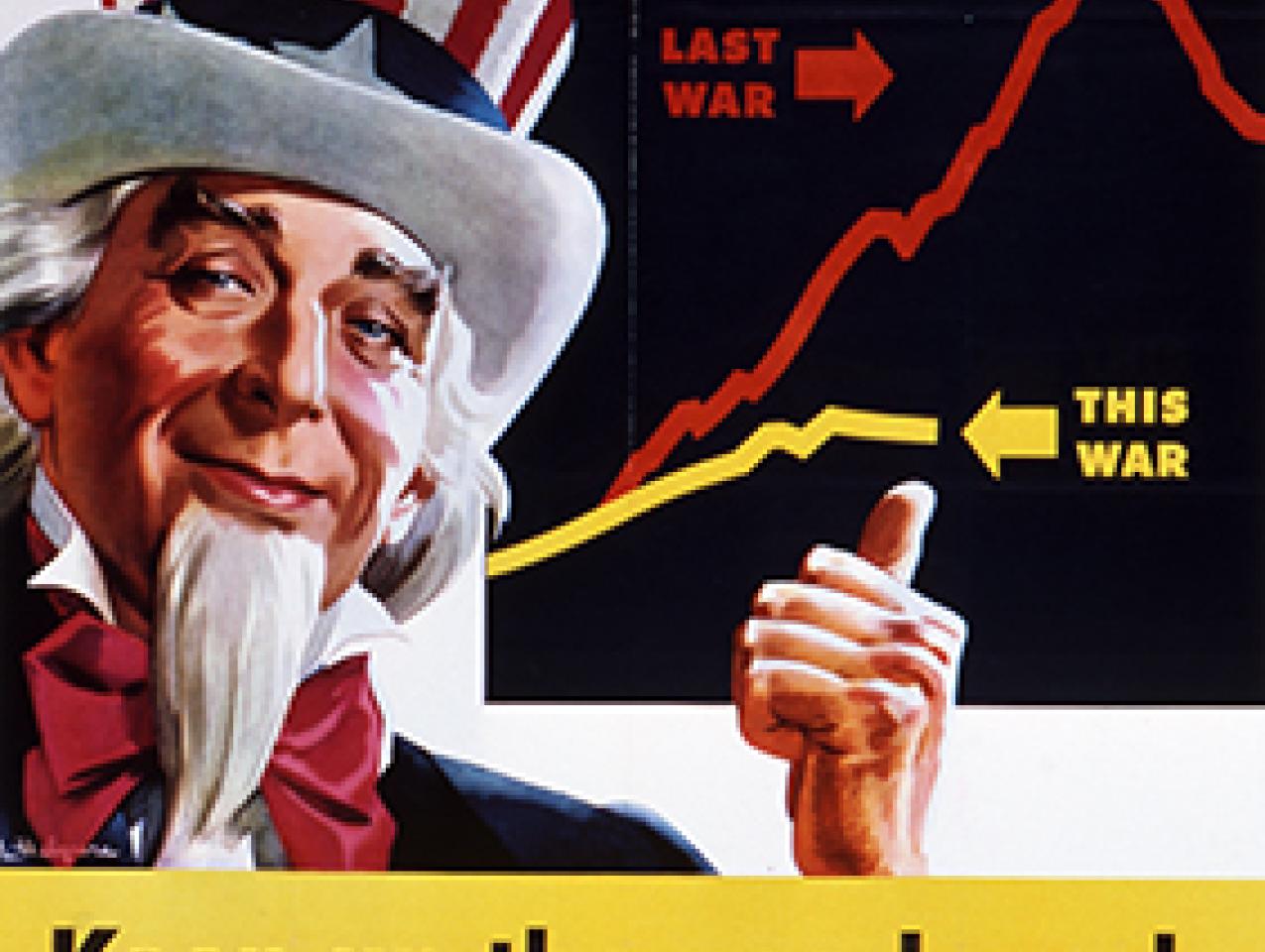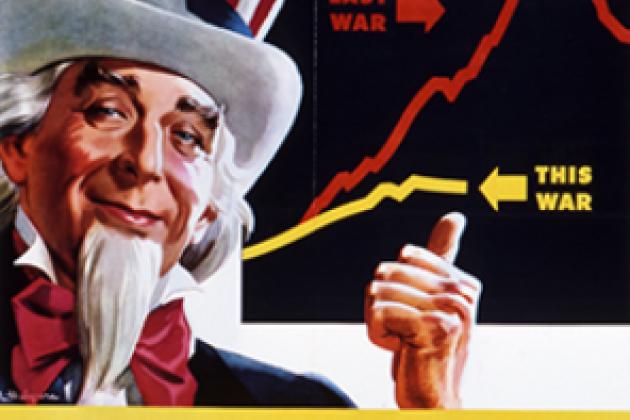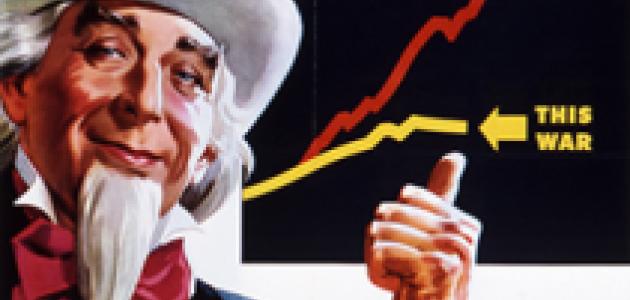- International Affairs
- US Foreign Policy
- Security & Defense
- Terrorism
- History
- Military
- US
- Politics, Institutions, and Public Opinion

Perhaps one of the few valid criticisms to fly around the Beltway every year is that the United States lacks a grand strategy. Nothing makes that clearer than the course of the past two decades. The real problem is not that American policy makers within and outside the government are not capable of turning out boiler-plate missives that utilize the word “strategy” innumerable times. The difficulty is that they are incapable of thinking strategically. What do I mean? The real issue is that few leaders have proven capable of devising and executing an effective grand strategy.
Among those few I would number Otto von Bismarck and Winston Churchill. Like other great strategists, they understood that humanity lives in a non-linear world of chance and uncertainty, and that no simple direct course would achieve their desired ends. They also recognized they could not predict second and third order effects, and that they would have to adapt to unexpected conditions that would emerge from the actions that their polity pursued. Perhaps most important, they understood the “other”: his history, his culture, his aims, and above all the kind of danger he represented—or the opportunities he might offer. Few of such perceptions have been present among America’s civilian and military leaders in recent decades.
Bismarck and Churchill are not typical of those who have guided states over the course of history. Clausewitz put the problem with wonderful irony: “[N]o one starts a war—or rather, no one in his senses ought to do so—without first being clear in his mind what he intends to achieve by that war and how he tends to conduct it.”1[1] We might pose a number of questions that strategists might ask in terms of decision making: What is the relationship between the means and ends? How much of a burden will our people be willing to bear? What is the nature of the opponent and the war that he is most likely to fight? Those questions are crucial to understanding America’s failures in wars over the past two decades.
The attack of al-Qaeda terrorists in 2001 on the World Trade Center presented the second Bush administration with a challenge that demanded a direct and substantive response, one very different from the anemic responses of the Clinton administration to the bombings of the U.S. embassy in Kenya and the near sinking of the USS Cole in Aden. The few token cruise missiles shot into the depths of Afghanistan made zero impact on the murderers surrounding bin Laden and the Taliban. The Bush response to 9/11was overwhelming and crushed the Taliban. But then things began to go wrong, perhaps because the success in Afghanistan had been so stunning. The advance of American-supported forces and the few U.S. troops on the ground chased bin Laden and the remains of his terrorist gang into the mountains of Tora Bora in eastern Afghanistan. There the Marines prepared to liquidate him, but U.S. Secretary of Defense Donald Rumsfeld and the CENTCOM commander in chief, Tommy Franks, decided instead to authorize the local warlords, with the support of U.S. special forces and air power, to pursue bin Laden.
Not surprisingly, they failed. We do not know whether the Marines would have succeeded, but they had the will to fight and therefore a better chance of succeeding. Killing bin Laden in 2001 would have represented a crucial political victory, and political gain is why one fights war. But with al-Qaeda now in Pakistan and having achieved our intermediate goal of overthrowing the Taliban, U.S. troops were in Afghanistan with no clear strategy. Policy makers and military were generally ignorant of the nature of Afghan society and history.
Moreover, to most in the American leadership, it did not matter, because almost immediately the attention shifted to the idea that our new approach to the Middle East—I hesitate to call it a strategy—required that we overthrow Saddam Hussein’s vicious tyranny in Iraq. And so, what was happening in Afghanistan, the more important arena in the eyes of the American public, fell by the wayside, while American attention focused almost exclusively on yet another war without either a final objective or a strategy to achieve it. Another brilliant victory in the field then led to years of frustration in the mire of fighting the insurgencies in Iraq, insurgencies that our own ignorance had contributed to.
In retrospect, it is hard to believe that policy makers and the intelligence communities believed Saddam was capable of developing nuclear weapons. The catastrophic defeat of 1991 had left him with a regime that was balancing on the brink of collapse. Yet, they clearly did, and the senior military leaders displayed far too much enthusiasm in preparing for a conventional military campaign that would allow them to display their ability to conduct “RDO (rapid decisive operations)” in the acronym of the time. The performance of the U.S. military machine in the conventional battles of March-April 2003 was extraordinary. But as Secretary of State Colin Powell had warned, the Crate and Barrel stricture (“if you break it you own it”) would apply after we had destroyed Saddam Hussein’s wretched, murderous regime.
Astonishingly, the victors, who had destroyed Iraq’s military forces in less than a month, found themselves quite literally at sea in the occupation phase of military operations. Rumsfeld not only displayed little interest in the postwar period but did much to make a sensible occupation impossible. The military did no better. Having focused on the conventional fight, those who found themselves responsible for an occupation neither calculated nor planned. The divisional commanders responsible for victory did have a sense of what needed to be done, but they were rapidly sent home. The civilian overseer, Paul Bremer, appears to have been selected because he had been a classmate of Vice President Dick Cheney at Yale. He lacked any knowledge of the language, history, and culture of the area. His military counterpart, Lieutenant General Ricardo Sanchez, was equally ignorant of Iraqi history, culture, and politics. Moreover, the two quickly hated other each other and refused to work together. The result was not only great confusion but military and political policies in constant tension with one another, while being incapable of following a coherent strategy.
Exacerbating the troubles at the top was the fact that most of the division and brigade commanders displayed little ability to recognize that a substantial insurgency was brewing, for many of the same reasons that had led to the rebellion against the British in Mesopotamia in 1920. Instead of conducting operations to control and protect the population, they focused on conducting military operations, often alienating Iraqi civilians in the process. In 2004, as matters were rapidly spiraling out of control, the Bush administration replaced Sanchez with General George Casey, who displayed only a slightly better understanding of insurgencies and the civil war that was exploding throughout Iraq.
As General Walter Boomer commented in Max Hastings’ Vietnam, “It bothers me that we didn’t learn a lot [about defeat in Vietnam]. If we had, we wouldn’t have invaded Iraq.” The long and short of it is that most senior U.S. military leaders had simply never studied the reasons that had led to the American defeat in Vietnam. It was as if that war had never occurred. The mess that followed underlined the general failure of American professional military education to prepare its officers intellectually for the unexpected. Two things saved the Americans from their appalling mistakes. The Sunni insurgency came apart due to the mistakes made by al-Qaeda and other terrorist groups; and the surge of 2007, conducted with far superior U.S. leadership, destroyed al-Qaeda in Iraq and created the possibility of reaching a reasonable level of stability.
However, everything almost came apart with the replacement of Ryan Crocker with Christopher Hill as the ambassador to Baghdad. Unlike the former ambassador, Hill was arrogant and contemptuous of the American military. He spent much of his time on the lacrosse field he had constructed on the grounds of the new American embassy. Moreover, he possessed little knowledge of the area, much less Iraqi politics. He had little patience for the military advice of General Raymond Odierno and was particularly contemptuous of the general’s chief adviser Emma Sky, who had spent over a decade working in the area.
Hill’s advice would lead to the continuance of al-Maliki in office despite his inability to reconcile Iraq’s disparate groups, not to mention his tolerance of government corruption. Astonishingly al-Maliki lost the 2010, even after forcing the Iraqi judiciary to ban dozens of popular candidates. Moreover, Hill ensured al-Maliki continued in office even though his opponents had received more votes in the elections. U.S. forces then completed their withdrawal. That decision removed nearly all the influence the United States had over al-Maliki. The result was the Iraqi president fully indulged his penchant for corruption and favoritism for those Shi’a particularly close to the Iranians.
With no one holding him back, al-Maliki attacked Sunni and secular political leaders and proceeded to purge virtually all the competent senior military officers in the army and replace them with corrupt cronies. The result was a near collapse of the Iraqi military in 2014 before the onslaught of ISIS, a radical terrorist group that soon proved to be more competent than al-Qaeda at the business of military operations. In the end, a combination of tribal action, outside support, massive commitment of U.S. air power, and incompetence within the organization brought ISIS under control. But the defeat of ISIS hardly represented an impressive success for American policy. What one sees in Iraq today is a fragile state, highly susceptible to Iranian influence. The result hardly justified the expenditure of American blood and treasure, or lived up to the rosy expectations of Bush administration officials in 2003.
The story of Afghanistan is even more dismal. After seven years of serving as a backdrop to the war in Iraq, with the election of Barack Obama as president, suddenly Afghanistan, the “Good War,” as Obama called it, appeared again as the focus of America’s attention. Dismissive of Iraq because he had been against that war from the beginning, Barack Obama turned enthusiastically to fix Afghanistan. But he soon discovered the United States confronted a morass. The eight wasted years had seen a failure of what one might even define as progress. The Taliban, aided extensively by the Pakistani ISI (Inter-Service Intelligence), had recovered its control over much of the countryside. Ironically, the Americans continued providing military and financial support to the Pakistanis as if they were our loyalist friends. Corruption was endemic.
Obama approached the mess he inherited in two ways: On the one hand, like a British nanny, he lectured Hamid Karzai, the president of Afghanistan, that he needed to clean up the corruption in his country. On the other hand, in December 2009, he ordered a surge of 30,000 U.S. troops into Afghanistan by the following July. But whatever the immediate tactical successes against the Taliban, the surge made little strategic sense, because in the same speech that he committed addition forces to fight the Taliban, Obama announced that the United States was going to pull them out of Afghanistan within eighteen months.
In the last eight years, the American effort has shifted into one aimed at building an Afghan military, while at the same time ignoring the problem of the Pakistani sanctuary enjoyed by the Taliban, or the military aid the Pakistanis were providing its fighters. American military policy failed because it aimed to train an Afghan army in a Western image. The problem is that the Afghans did not need such a military. Rather, they needed niche support which fitted modern capabilities into their culture and their way of war.
For Afghanistan it is too late. There are, however, lessons that we might learn from our defeat. The first and most important, as Clausewitz suggested, is that we should understand the character of the war on which are embarking. Sun Tzu can then add that we need to not only understand the enemy, but ourselves as well. Nothing better sums up the appalling ignorance of the American performance in Afghanistan than the fact that the Pakistanis have been playing us for fools. Pakistani General Hamid Gul, the leader of the ISI in the late 1980s, said it best. “When history is written,” he declared on a Pakistani TV show in 2014, “it will be written that the ISI defeated the Soviet Union in Afghanistan with the help of America.” A moment later he added, “Then there will be another sentence. The ISI with the help of America, defeated America.”
As one looks over the wreckage of American policies toward Iraq and Afghanistan, one is reminded of the comment of a young Marine lieutenant, who is now a representative in the Congress of the United States, at the conclusion of the movie No End in Sight: “America can do better.”















